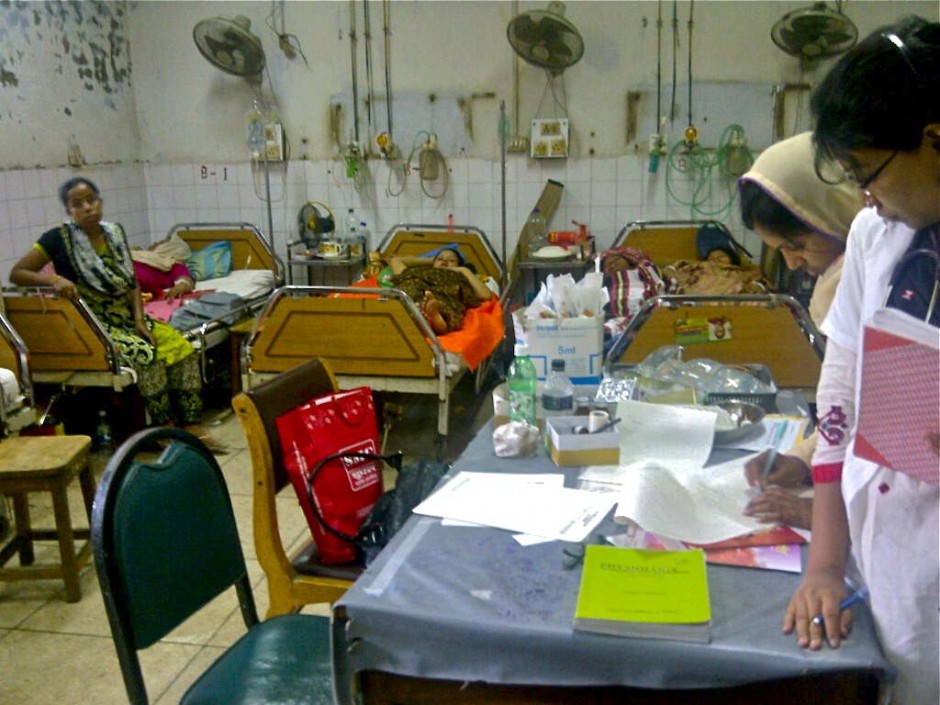A project aimed at finding and treating women at risk of succumbing to pre-eclampsia – the often-fatal onset of high blood pressure during pregnancy – will receive an additional $17 million from the Bill & Melinda Gates Foundation.
Peter von Dadelszen, a UBC professor of obstetrics and gynaecology and a clinician-scientist at the Child & Family Research Institute (CFRI) is leading the multi-pronged effort in 11 developing countries, which has previously received $7.4 million from the Gates Foundation.
This second grant will allow Dr. von Dadelszen’s team to conduct much larger trials in four countries – Nigeria, Mozambique, Pakistan and India – involving 130,000 expectant mothers. Although pre-eclampsia is easily treated in hospital, it is the second-leading cause of maternal death because women are not properly diagnosed or not transported to appropriate facilities.
The onset of high blood pressure during pregnancy can cause seizures (eclampsia), stroke or failure of the lungs, kidney or liver. It kills 76,000 women a year, almost all of them in the developing world, through bleeding or organ failure; thousands more suffer permanent brain damage or blindness. It is major cause of stillbirths, and children who survive face a much higher risk of stunted growth or cerebral palsy.
The treatment for pre-eclampsia is not complicated – the mother must be taken to the hospital so that her blood pressure can be managed and her seizures prevented through medication, and her delivery induced as soon as is feasible for the baby. Delivery is the only sure treatment.
Dr. von Dadelszen’s team includes hundreds of public health officials, health researchers and health care providers around the globe, many of them in Asia and Africa, as well as the World Health Organization.
The project is testing a simple method, devised by Dr. von Dadelszen, for diagnosing pre-eclampsia and assessing the degree of risk, based on a woman’s symptoms and a physical examination. Study sites will use smartphone technology, developed with UBC/CFRI researchers Mark Ansermino and Guy Dumont, that calculates a risk score and helps community health workers who are trained to diagnose the condition, administer medication and arrange urgent transport when needed.

A ward for treating women with pre-eclampsia in Dhaka, Bangladesh. Photo credit: Diane Sawchuck, Executive Director, PRE-EMPT & adjunct professor of nursing, UBC
The key to this diagnostic and treatment pipeline, extending from remote villages to urban hospitals, is raising community awareness of women’s health, the warning signs of illness and the importance of seeking medical help before emergencies occur.
“Pre-eclampsia should be as survivable in Nigeria as it is in Canada, but the difference in outcomes is stark,” says Dr. von Dadelszen, who is a Consultant in Maternal Fetal Medicine at BC Women’s Hospital & Health Centre. “Too many women enter hospitals in Asia and Africa already too sick to save, or having suffered strokes, or having lost their baby. We want to see if we can remedy this inequity through a combination of training, community education and a dose of technology.”
In addition to testing diagnostic and treatment strategies, Dr. von Dadelszen’s project is examining whether women with a history of pre-eclampsia and low calcium intake are helped by calcium supplements, as well as a trial of three orally-administered blood pressure-lowering drugs to determine which one is the most effective.
